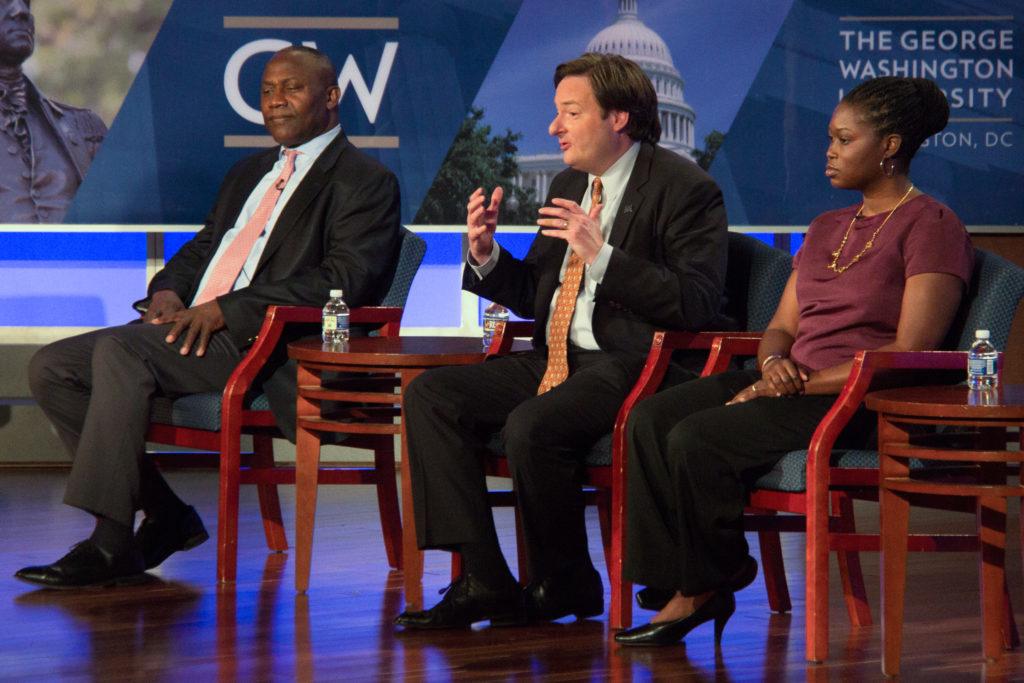About 50 people gathered in Jack Morton Auditorium Wednesday to discuss the concerns of international students regarding their education in the U.S.
The event, hosted by the publicly funded radio broadcaster Voice of America, focussed on the admissions process and other challenges international students face in the classroom. Panelists included experts from GW and seven other universities, including Stanford and Johns Hopkins universities.
Journalist and TV host Sarah Zaman fielded questions to the panelists. Audience members and those watching from social media platforms, like Facebook Live, were also encouraged to participate during the town hall.
Here are some of the highlights from the event:
1. Culture shock
One of the most significant barriers affecting international students is the discomfort that comes from living in an unfamiliar place, the panelists agreed. Raj Bhargava, a startup mentor and pre-collegiate educator at Stanford University, touched on his own experiences as an international student and how he modified his way of thinking to cope with these changes.
“With a closed mindset every change looks like an obstacle. With an open mindset every change is a learning opportunity,” he said.
Panelists also answered questions about access to support services for international students at their own universities. They said that most universities reported having these resources readily available as long as students felt comfortable enough to ask for them.
Other universities, like Wellesley College and GW, have orientations tailored specifically for international students that teach specific skills, including how to manage finances, pursue employment or even how to buy a cell phone.
“I do think that one of the biggest pieces of advice is that if you start to notice that there is a challenge, ask for the help up front,” Sam Brown, the director of International Student and Scholar Services at Brigham Young University, said. “I think it’s hard to admit initially that it’s a challenge, but then you can work to fix it early.”
2. Academic success
The panelists said that one of the key determinants of whether or not an international student will be successful at a U.S. university has to do with their mastery of the English language. Although all applicants must take an exam demonstrating their proficiency, language barriers can still present challenges in the classroom.
James Dorsett, the director of the Office of International Students and Scholars at Michigan State University, said that Michigan State offers classes to help international students feel more familiar with their non-native language.
“If they’re admitted academically but don’t have that English proficiency it is still possible for them to come to the U.S. and take those concentrated english proficiency courses on campus,” he said.
Karen Pabon, the director of the Slater International Center at Wellesley College, said that there are many aspects of these learning environments that international students have never encountered before.
“A U.S. classroom may also be more interactive or you may have a more informal relationship with your professor,” she said.
3. Immigration concerns
Questions from the audience revealed insecurities that many potential and current international students have about living in the U.S. political climate. One potential applicant asked via Facebook whether or not they could wear a hijab and still go to school in the U.S. Another asked if universities were accommodating of certain dietary or living restrictions.
“While there might be some questions and some misunderstandings about your cultural background, you have the opportunity to share what that is,” Brown said. “You would absolutely still be allowed to study in the United States.”
GW’s Senior Associate Provost Doug Shaw said that providing information and support to international students with immigration concerns was a priority.
“Here in DC we’ve been working very actively to understand the changing immigration context and to make sure we’re ready to support our students,” he said. “We are continuously learning how best to serve our students and make that transition to the U.S. easy and comfortable for them.”





